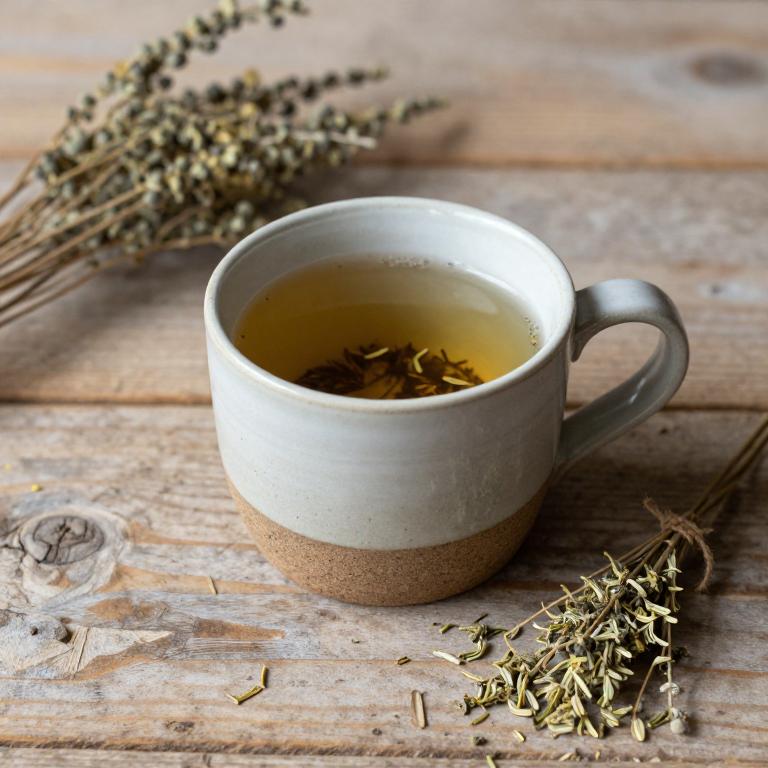10 Best Herbal Teas For Gum Pain

Herbal teas can be a natural and soothing remedy for gum pain, offering gentle relief without the side effects of traditional medications.
Chamomile, peppermint, and green tea are popular choices due to their anti-inflammatory and antimicrobial properties that help reduce swelling and fight bacteria. To use these teas, simply steep a few tea bags in hot water and let them cool before applying them to the affected area or drinking them regularly. These herbal remedies are especially beneficial for those seeking alternative treatments or who may have sensitive gums.
However, it's important to consult with a dentist if gum pain persists, as it could indicate a more serious underlying condition.
Table of Contents
- 1. Salvia (Salvia officinalis)
- 2. Oregano (Origanum vulgare)
- 3. German chamomile (Chamomilla recutita)
- 4. Lemon balm (Melissa officinalis)
- 5. Ceylon cinnamon (Cinnamomum zeylanicum)
- 6. Peppermint (Mentha piperita)
- 7. Eucalyptus (Eucalyptus globulus)
- 8. Camellia (Camellia sinensis)
- 9. Echinacea (Echinacea purpurea)
- 10. Ceylon cinnamon (Cinnamomum verum)
1. Salvia (Salvia officinalis)

Salvia officinalis, commonly known as sage, is a traditional herbal plant that has been used for centuries for its various health benefits, including its potential to alleviate gum pain.
Sage contains compounds such as rosmarinic acid and thujone, which possess antimicrobial and anti-inflammatory properties that can help reduce infection and irritation in the gums. When brewed into a herbal tea, sage can soothe inflamed tissues and promote healing in the mouth. However, it is important to use sage tea in moderation, as excessive consumption may cause gastrointestinal discomfort.
As a natural remedy, sage herbal tea can be a gentle and effective option for those seeking relief from mild gum pain.
2. Oregano (Origanum vulgare)

Orihanum vulgare, commonly known as oregano, is a versatile herb that has been traditionally used for its medicinal properties, including its potential to alleviate gum pain.
The essential oils in oregano, particularly carvacrol and thymol, possess strong antibacterial and anti-inflammatory effects, which can help reduce the bacterial buildup that often causes gum inflammation and pain. When brewed into a herbal tea, oregano can soothe irritated gums and promote oral health by fighting harmful pathogens. To use oregano for gum pain, it is typically steeped in hot water and consumed several times a day, or applied as a mouth rinse.
While oregano tea is generally safe, it is advisable to consult a healthcare professional before using it, especially for those with existing health conditions or who are pregnant.
3. German chamomile (Chamomilla recutita)

Chamomilla recutita, commonly known as German chamomile, is a herbal remedy often used to alleviate gum pain due to its anti-inflammatory and soothing properties.
When brewed into a tea, it can help reduce swelling and irritation in the gums, providing natural relief for minor dental discomfort. The essential oils in chamomile, such as bisabolol and chamazulene, contribute to its ability to calm inflamed tissues and promote healing. While it is generally safe for most people, it is advisable to consult a healthcare professional before using it, especially if you have allergies or are taking other medications.
Incorporating chamomile tea into a daily routine may support overall oral health and offer a gentle, natural alternative to conventional pain relief methods.
4. Lemon balm (Melissa officinalis)

Melissa officinalis, commonly known as lemon balm, is a versatile herb often used in herbal teas to address various health concerns, including gum pain.
This calming herb contains compounds such as rosmarinic acid and flavonoids, which have anti-inflammatory and antioxidant properties that may help reduce gum irritation and swelling. When brewed into a soothing tea, lemon balm can provide a gentle, natural remedy for those experiencing discomfort from gingivitis or minor gum inflammation. Its mild flavor makes it an appealing option for regular use, and it can be combined with other herbs like chamomile or mint to enhance its soothing effects.
However, while lemon balm tea may offer relief, it should not replace professional dental care for more severe gum issues.
5. Ceylon cinnamon (Cinnamomum zeylanicum)

Cinnamomum zeylanicum, commonly known as cinnamon, is often used in herbal teas to alleviate gum pain due to its antimicrobial and anti-inflammatory properties.
The essential oils found in cinnamon, such as cinnamaldehyde, help reduce inflammation and fight bacteria that contribute to gum infections. When brewed into a warm tea, cinnamon can soothe irritated gums and promote a sense of relief. It is typically combined with other soothing herbs like chamomile or licorice root to enhance its effectiveness.
Regular consumption of cinnamon herbal tea may support overall oral health and reduce the frequency of gum-related discomfort.
6. Peppermint (Mentha piperita)

Mentha piperita, commonly known as peppermint, is a popular herb used in herbal teas to alleviate gum pain due to its soothing and anti-inflammatory properties.
The cooling effect of peppermint helps reduce inflammation and numb the pain in the gums, offering temporary relief from discomfort. Peppermint tea can also help freshen breath and reduce bacterial growth, which may contribute to gum irritation. When brewed as a warm infusion, it can be gently applied to the affected area or consumed to ease internal discomfort.
Regular use of peppermint herbal tea may support overall oral health and provide a natural alternative to conventional pain relievers.
7. Eucalyptus (Eucalyptus globulus)

Eucalyptus globulus, commonly known as peppermint eucalyptus, is often used in herbal teas to alleviate gum pain due to its anti-inflammatory and antiseptic properties.
The essential oils found in this plant contain compounds like eucalyptol, which can help reduce swelling and soothe irritation in the gums. When brewed into a tea, it can provide a refreshing and cooling effect that helps ease discomfort and promote healing. However, it is important to use it in moderation and consult a healthcare professional if symptoms persist.
This herbal remedy can be a natural alternative for those seeking relief from gum pain without the use of harsh chemicals.
8. Camellia (Camellia sinensis)

Camellia sinensis, the plant from which green, black, and white teas are derived, contains bioactive compounds such as polyphenols and catechins that have anti-inflammatory and antimicrobial properties.
These properties make Camellia sinensis herbal teas a potential natural remedy for gum pain, as they may help reduce inflammation and combat bacteria that contribute to periodontal issues. Studies suggest that regular consumption of these teas can improve oral health by strengthening gums and reducing the risk of gingivitis. However, it is important to note that while these teas may offer supportive benefits, they should not replace professional dental care.
Incorporating Camellia sinensis herbal teas into a daily routine, alongside good oral hygiene practices, may contribute to overall gum health and comfort.
9. Echinacea (Echinacea purpurea)

Echinacea purpurea, commonly known as purple coneflower, is a popular herbal remedy often used to support immune health and reduce inflammation.
When brewed into a tea, echinacea may help alleviate gum pain by reducing swelling and soothing irritated tissues in the mouth. Its anti-inflammatory and antimicrobial properties are believed to combat bacterial infections that can contribute to gum disease. While some studies suggest echinacea may have mild pain-relieving effects, it is not a substitute for professional dental care.
Individuals considering echinacea tea for gum pain should consult with a healthcare provider, especially if they have allergies or are taking other medications.
10. Ceylon cinnamon (Cinnamomum verum)

Cinnamomum verum, commonly known as true cinnamon, is often used in herbal teas to help alleviate gum pain due to its anti-inflammatory and antimicrobial properties.
The essential oils in cinnamon, particularly cinnamaldehyde, can reduce inflammation and soothe irritated gums when consumed as a tea. To prepare the tea, a few cinnamon sticks or a teaspoon of ground cinnamon can be steeped in hot water for several minutes. Regular consumption of cinnamon tea may help prevent bacterial growth that contributes to gum disease.
However, it is advisable to consult a healthcare professional before using cinnamon tea as a remedy, especially for persistent or severe gum issues.